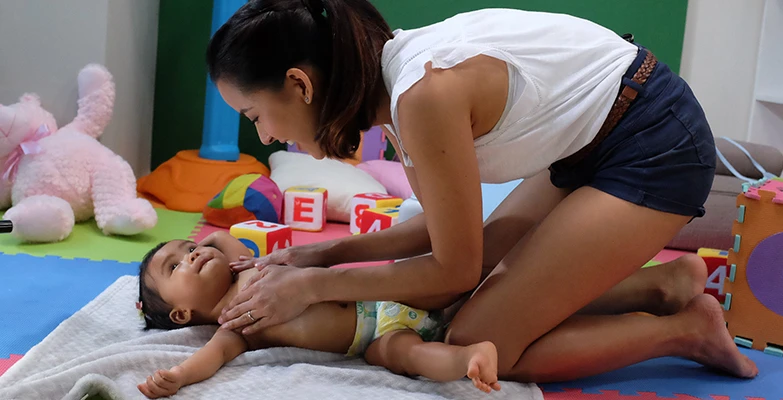The Safety in Your Touch
Moms instinctively use their gentle, loving touch to care for their babies. But do you know just how much of your baby’s development actually depends on your touch?
Your touch nurtures your baby’s healthy, happy development.
Studies show that the way you touch your baby plays a key role in supporting her social-emotional and even physical and intellectual development.
Touch is the first language that your baby learns. While she was still in your tummy, she was already getting tactile stimulation from the vibrations of your heartbeat.
Touch, then, is one of the best ways to communicate your love and affection to your child. It can help her feel safe and cared for, exactly what she needs in order to develop in the best way possible.
Experts call this the Secure Attachment Bond.
The Secure Attachment Bond is the emotional relationship that forms between you and your baby when you consistently and successfully respond to her nonverbal cues.
These nonverbal cues – the little movements, looks and sounds – are baby’s way of communicating to you. When you respond with your own nonverbal language – your touch, your expressions, your tone of voice – you’re letting baby know that she can trust you to keep her safe and understood.
It is this feeling of safety that helps her feel calm enough to develop well internally, as well as explore the external world around her more confidently.
Think of it this way:
the more your child knows that you’re there to catch her, the higher she can jump, the more she can reach.
It pays to know your baby’s language.
Long before learning how to talk, your baby is already communicating with you via nonverbal cues.
Spend time studying and understanding these cues so you know what kind of response will bring out the best in her.
For example, your baby could be signaling a need for attention when she:

Smiles or looks into your eyes

Makes little cooing or gurgling noises

Moves closer to you by crawling or holding out her arms

Mimics your movements

Looks curious and interested

Cries
When she needs a break on the other hand, she might:

Avoid eye contact and close her eyes

Struggle to pull away

Look upset or uncomfortable

Yawn

Cry
Your loving touch is often the best response.
When your baby starts communicating with you, often the best way to ‘talk back’ is with your hands. In fact, though you may not be consciously aware of it, your touch says so much about how you feel and what you want to happen.
A hesitant touch could convey uncertainty, a sudden squeeze could connote fear, while gentle strokes send signals of safety and protection.
Use your touch to speak a language of comfort and support to your baby. Give her tickling caresses when she’s feeling playful, a firm hug when she’s upset, and a soothing massage when she needs to relax.
Your hands literally hold the secret to keeping your baby feeling safe, secure and deeply cared for – feelings that make up a solid foundation for her healthy, happy development now until later on in life.
When your baby feels safe, there’s so much more room to grow.
Secure attachment is the optimum environment for your baby’s social and emotional development to flourish. It makes her feel safe enough to trust others as well, enriching her ability to connect with others and form healthy relationships.
Seemingly complex qualities like empathy, love and understanding are actually first learned during infancy.
When babies feel safe and secure, they become better at:

Developing close and meaningful relationships

Achieving emotional stability

Having a healthy self esteem

Enjoying the company of others

Recovering from feelings of loss and disappointment

Being open about their feelings and asking for help
The benefits aren’t limited to the social and emotional. Other aspects of your child’s development are also enhanced. A baby that feels secure will be more willing to play, explore and move about, stimulating physical growth. While a calmer baby will be better at processing information, leading to intellectual development.
In other words, your baby stands to gain so much from your gentle, loving touch. It’s your best response to what she needs most right now. Use it to nurture her development and bring out her very best.
Sources:
http://www.helpguide.org/articles/secure-attachment/how-to-build-a-secure-attachment-bond-with-your-baby.htm http://www.helpguide.org/articles/secure-attachment/what-is-secure-attachment-and-bonding.htm http://www.helpguide.org/articles/secure-attachment/what-is-secure-attachment-and-bonding.htm https://www.psychologytoday.com/articles/201303/the-power-touch http://www.parenting.com/article/a-mothers-touch
Moms around the world trust JOHNSON’S® to care for their babies
We are committed to working with moms, healthcare experts and scientists to ensure our products continue achieving the highest JOHNSON’S® baby standards.
Learn how we're making JOHNSON’S® products even better for your baby >
Toddler Bathing
Make brushing your toddler’s teeth a part of his bathing routine.

Baby Bath Seats
Baby bath seats have recently undergone changes to align with stricter safety standards — but they are still controversial. BabyCenter® shares what to look for if you purchase one.
